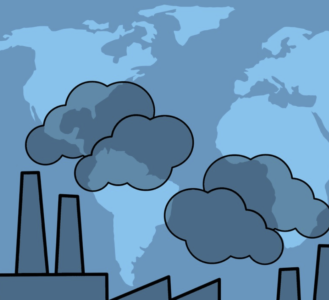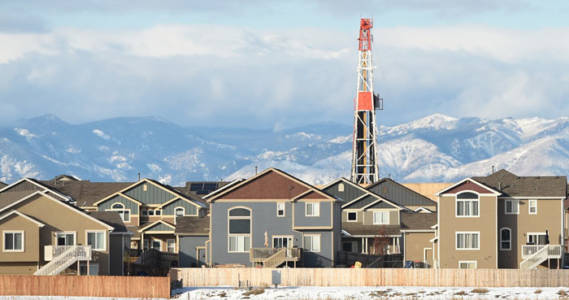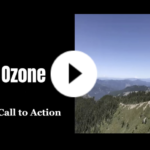By Heidi Leathwood

Groups Call on Oil & Gas Commission for Rules to Address Harmful Cumulative Impacts
This week, 350 Colorado, along with other environmental groups representing well over 100,000 Coloradans impacted by climate change and air pollution formally petitioned the Colorado Oil and Gas Conservation Commission (COGCC) to make new rules to address the harmful cumulative impacts of the oil and gas industry: a mandate enacted in 2019 by SB19-181.
The 2019 law requires the Colorado Oil and Gas Conservation Commission to stop ‘fostering’ oil and gas development and start regulating to protect public health, welfare, safety, the environment and wildlife. It also required the Commission to “adopt rules that . . . in consultation with the Department of Public Health and Environment, evaluate and address the potential cumulative impacts of oil and gas development.” Colorado Revised Statutes § 34-60-106(11)(c)(II) (emphasis added).
This rulemaking petition from WildEarth Guardians, 350 Colorado, Womxn from the Mountain, Physicians for Social Responsibility, The Larimer Alliance, and Sierra Club of Colorado follows a May letter to which the Commission never replied. The May letter, submitted by 30 groups, had requested a more comprehensive analysis and report of cumulative impacts, including an expansion of the Commission’s cumulative impacts evaluations to include not only pollution from oil and gas operations, but pollution from other sources as well. Groups decided to take further action by formally requesting rules to address their concerns.
Why is a Formal Petition to the Colorado Oil and Gas Conservation Commission Needed?
Though it has been over three years since SB19-181 passed into law, the Commission has adopted only a handful of rules that address a small subset of local cumulative impacts such as dust, noise and light.
While petitioners acknowledge there are many cumulative impacts that will need to be addressed by the Commission, air pollution is that category addressed in the current rulemaking petition. The petitioners demand the COGCC make rules to address the regional and state cumulative impacts of ozone and climate change and to increase local protections against air pollutants, especially in disproportionately impacted communities.

Neighborhood fracking in Colorado
Many fracking sites and other oil and gas extraction sites occur in areas already heavily polluted by transportation, industry and other nearby oil and gas sites. Currently, rules for oil and gas require them to report pollution generated by other nearby oil and gas sites, but not the industrial pollution or the pollution from highways. No measurements are taken of background air pollution to see if there is an existing air pollution problem or if new wells will put the area over health standards for pollution. No analyses are required of existing pollution and related issues in disproportionately impacted communities and how new wells will add to those issues. And no rules exist to prevent new wells from adding to existing problems.
Many existing and planned oil and gas projects are located in the Denver Metro-North Front Range ozone nonattainment area, which will in just a few weeks be designated as being in ‘severe’ nonattainment for EPA health-based standards.
Oil and gas contributes to our ozone problem by emitting the most ozone precursor substances by far. Fracking and other oil and gas sites generated 37% of total VOCs emitted and 26% of NOx in 2020. The oil and gas industry in Colorado emits more VOCs than on-road sources, off-road sources, and non-oil and gas point sources combined, and 1.33 times more than all non-oil and gas area sources. (This information is reported in the draft State Implementation Plan for ozone, p. 56, Appendix 3-A.)
Despite their mandate to address cumulative impacts, the Commission has not yet considered rules for curtailing oil and gas activities in ozone nonattainment areas.
In addition to being the top cause of ozone, oil and gas operations are one of the largest emitters of greenhouse gasses in our state, as shown by the 2021 Greenhouse Gas Pollution Inventory. As the 5th highest producer of oil and the 7th highest producer of gas in the top producing country in the world, Colorado’s contribution to global climate change is substantial compared to its small size. Yet the Commission has not considered rules to address the cumulative impact of climate change, despite Colorado’s ever-increasing climate change impacts.
Multiple recent independent studies have found that the American West is currently experiencing a mega-drought that is the worst in the past 1,200 years and point to human-caused climate change as much of the cause. The warming in Western Colorado is more than double the national average, putting the area at even greater risk. Much of Colorado’s cumulative pollution puts an unjust burden on historically marginalized low-income communities and people of color, further amplifying the urgency to address the issue.
What does this Petition to the COGCC Hope to Accomplish?
Proposed rules in today’s rulemaking petition submitted by groups include:
- A definition of cumulative impacts that includes “total effects on a resource, ecosystem, or human community” and takes into consideration “all other activities affecting that resource no matter what entity… is taking the actions.”
- Equity analyses for projects proposed in or near disproportionately impacted communities with rules preventing approval if the proposed projects will increase the cumulative pollution levels of disproportionately impacted communities.
- Rules to prevent approval of permits in any area if the pollution they create will put the local area above health-based standards for NAAQS substances and HAPS.
- Rules to prevent certain high-emitting oil and gas activities during ozone season or on high-ozone days
- Rules to prohibit new oil and gas permits if the State has determined we are not meeting our greenhouse gas reduction targets, and rules to prohibit new permits in the counties that have already warmed 1.5 degrees Celsius or more.Who Was Involved in Submitting the Petition to the COGCC?
WildEarth Guardians’ Climate and Energy Program Attorney Kate Merlin was the lead author for the petition, with Heidi Leathwood from 350 Colorado providing research and support in writing. Other groups collaborated on rule ideas, with Renée Millard-Chacon, Co-founder and Executive Director of Womxn from the Mountain, and Environmental Justice Task Force member providing leadership on the proposed rules for equity analysis and Natasha Leger, Executive Director of Citizens for a Health Community provided support for the proposed rule limiting new activity in the areas impacted by high local warming. Many others offered help and support as well.
Some members of the public may fear additional regulations could affect their pocketbooks, not realizing that Colorado produces more than double the oil and gas resources we need in state, and exports most of it. Those fears are unfounded.
“Colorado’s production does not meaningfully change the price that Colorado consumers pay for fuel — it’s a global commodity with prices set by the balance of global demand and global production plus industry profiteering — but our bad air quality does cost Coloradans in health spending, in lost life and lost productivity,” says Kate Merlin, WildEarth Guardians’ Climate and Energy Program Attorney. “It hurts our tourism industry. It hurts our most vulnerable people: children and the elderly. It also hurts folks who work outside, like postal carriers, road crews, and farm and ranch workers.”
What Next? Here’s How You Can Take Action.
Now that the petition has been submitted, the Commission will decide whether to approve or deny the petition. If they approve, they will begin a rulemaking process, and the public can get involved by giving public comment. Stay tuned!
In the meantime you can sign our one-click letter to tell the Colorado Oil and Gas Commission, the Air Pollution Control Division, the Air Quality Control Commission and the Governor ozone pollution caused by oil and gas is a serious issue and we want them to take strong action.

